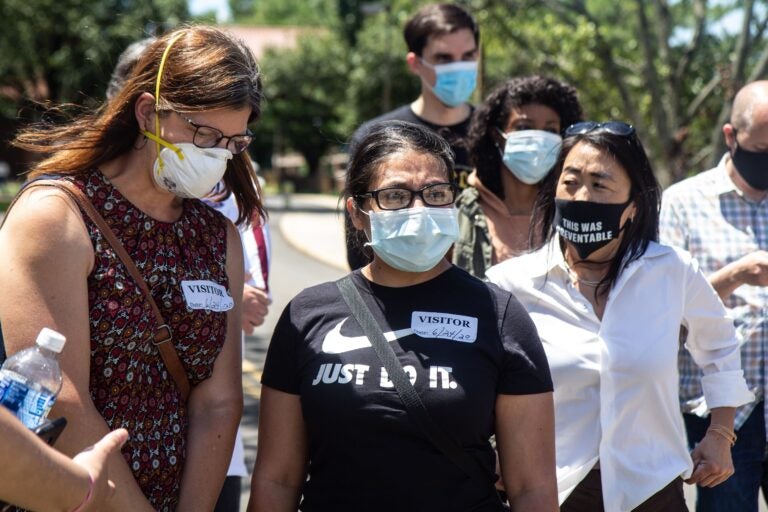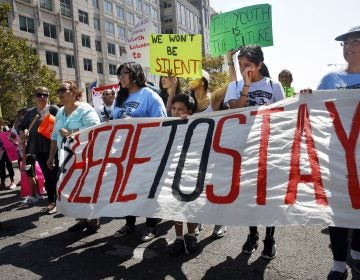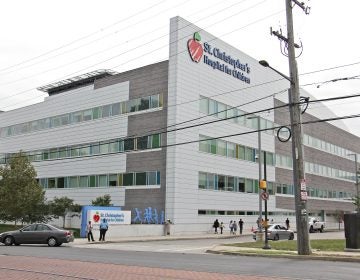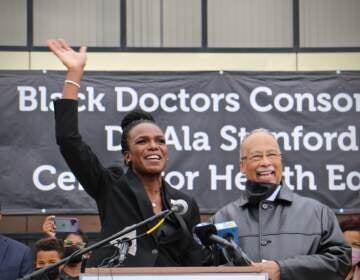Medical deportation averted in case of Guatemalan patient at Jefferson Torresdale
Immigration advocates say the hospital would have been violating its ethical obligations to care for the man, injured in a traffic accident and uninsured.

Claudia Martinez updated press on the condition of her uncle, who is hospitalized, undocumented, facing deportation. (Kimberly Paynter/WHYY)
Updated 4:30 p.m.
Immigration advocates and family members say Jefferson Health has stepped back from a plan to repatriate via private charter a Guatemalan man currently receiving uninsured treatment at one of its facilities.
Attorneys representing the family say the man, a 48-year-old patient from North Philadelphia who was rolled over by a motorcyclist in mid-May, was scheduled to be transported to his country of origin Wednesday morning, without the involvement of federal authorities. But after 24 hours of negotiations in which City Councilmembers Helen Gym, Bobby Henon and Maria Quiñones-Sánchez were involved, the health system changed its decision.
“Thank God, we got to stop the deportation for today, and they’re giving us four weeks. There’s nothing in writing, only by word, that’s what they told us,” the man’s niece, Claudia Xitmul Martínez, said in Spanish at a news conference outside Jefferson Torresdale Hospital in Northeast Philadelphia, where the man is being treated for his injuries.
“No decision should be made based on an individual’s immigrations stautus is or their ability to pay,” said @HelenGymAtLarge outside of Jefferson-Torresdale hospital who is planning a medical deportation of a patient to Guatemala injured on a traffic accident in mid-May. pic.twitter.com/vxdsH5WJTc
— Catalina Jaramillo (@cjaramillo) June 24, 2020
David Bennion, an attorney with the Free Migration Project who is representing the family, said by planning what he called a medical deportation, the hospital was violating its ethical obligations.
“They did not obtain informed consent, according to the family, either from the patient or from his family,” Bennion said. “And so they have no authority to deport him — they’re not the immigration authorities, the immigration authorities are not involved at present. And we need Jefferson Hospital to hear the community and to hear the family and not send this man to his death.”
Immigration advocates declined to give the man’s name.
In a statement Wednesday morning, Jefferson Health did not confirm the deportation plans or reveal any particulars of the case, citing federal privacy laws. But it said all decisions have the well-being of patients as a priority.
In a statement emailed Wednesday afternoon, after the press conference with Councilmembers Gym and Henon, the hospital system said, “Jefferson Health does not transfer any patient without the consent of the patient, or if the patient cannot consent, a family member or their legally appointed decision maker. We have no out-of-country transfers scheduled from Jefferson Health – Northeast.”
Bennion said that the family never gave consent, and that they were not provided with appropriate translation.
“The hospital doesn’t want to pay for his ongoing care,” Bennion said. “He doesn’t have insurance, so they’re trying to do a private medical deportation. And, yes, it’s expensive, and we, as a society, need to figure out how to care for the most vulnerable members of our society. But the answer is not send this man down where he’s not going to get the care that he needs.”
Gym said the patient’s family was not given the tools or the time to make decisions. She added that the city will have to make sure repatriations made by hospitals based on patients’ ability to pay or immigration status don’t happen again.
“This is one of the ways in which many members of the immigrant community can be exploited and subjected to conditions that most of us have no idea are even going on in this country,” she said.
Family, immigration advocates and Jefferson University students rallied Wednesday morning outside Jefferson Torresdale Hospital until the police asked them to leave, saying it was private property.
“We are asking for the hospital to give him more time until he gets better because he’s feeling now so bad. He got a brain injury, and I don’t think he’s going to be able to handle it when he goes back to our country in Guatemala,” the patient’s nephew, Dimas Xitmul Martinez, said Wednesday morning. “It’s illegal too, if they’re going to deport it, I don’t think that’s fair.”
Dimas Xitmul Martinez said his uncle was injured by the motorcyclist on the night of May 10 and has been at Jefferson Torresdale since. His uncle has two broken legs, several fractured ribs and neurological trauma from the incident — he doesn’t recognize his relatives, is not aware he’s in a hospital and has lost his memory. He has been living in Philadelphia for about 20 years, working as a carpenter making kitchen cabinets, Xitmul Martinez said, adding that his uncle has two children and a partner living in Guatemala.
But his relatives living in Philadelphia, two nieces and two nephews, worry he won’t be able to receive adequate treatment in Guatemala, especially because hospitals there are at capacity due to the coronavirus pandemic. The family said communication with Jefferson has been extremely difficult because most of them require a Spanish interpreter to understand what’s going on.
“We are all humans, and I know that he’s illegal in the United States, but I think he needs the help of the community and I think the hospital should help him instead of just deporting him in this situation right now, with the COVID-19,” Xitmul Martinez said.
Immigration advocates called this a case of medical deportation, also known as medical repatriation.
“It’s a really, really complicated and ambiguous area, not only of the law, but also of medical ethics. And I know that the American Medical Association has stated very clearly that any discharge plan for a client should under no circumstances take into account the client’s immigration status, or the patient’s ability to pay for care. And yet it seems as if that is exactly what is happening here,” said Kara Finck, of Penn Law.
Bennion said he’s never seen this before in Philadelphia, but has heard of the practice of hospitals making the decision to repatriate seriously injured or ill undocumented immigrants with no insurance in the past.
“I don’t know how many times Jefferson Hospital has done this before — how many people that should have received medical care have been sent to their deaths or long-term impairment because they didn’t get the care that they need,” he said.
WHYY is your source for fact-based, in-depth journalism and information. As a nonprofit organization, we rely on financial support from readers like you. Please give today.







